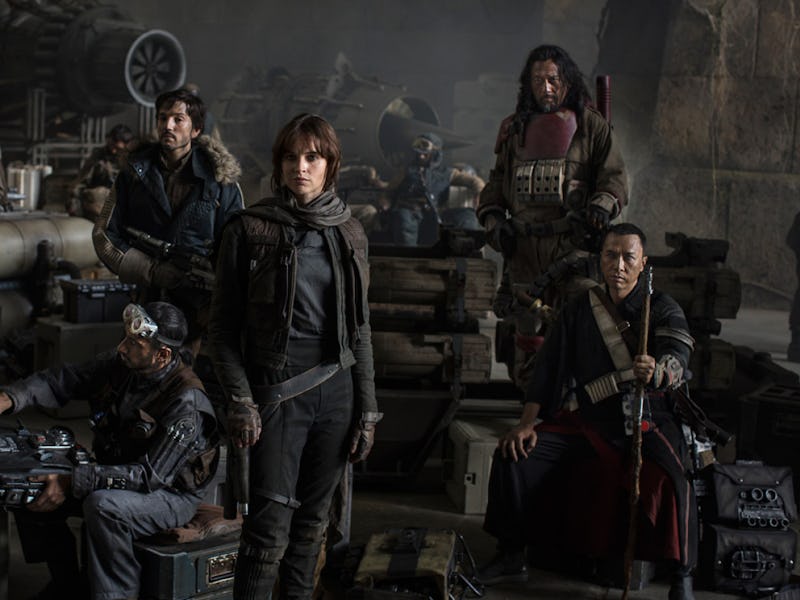Modern Blockbuster Escapism Resonates Now More Than Ever
When far-off worlds resemble ours in more ways than one.

After such a shocking presidential election, questions about pop culture filmmaking seem trite. What does it matter whether Doctor Strange out-grosses Guardians of the Galaxy, or who cares about the post-credit teases for the Marvel Cinematic Universe? Why waste time trying to figure out how Rogue One is connected to the original Star Wars trilogy? When white nationalists are ascending to key White House positions, national registries based on religions are being bandied about like serious policy considerations, and civil rights legislation might be gutted by the President-elect, entertainment pales in comparison to real issues. But that doesn’t mean escapism doesn’t matter — in fact, its more important than ever.
The dawn of American filmmaking is precipitated by political and economic upheaval. During the Great Depression and then World War II, Hollywood, in addition to making propaganda and military films, provided Americans with a valuable service: of giving them a few hours of their day that didn’t remind them that the world was going to shit. Movie-houses reassured an anxious, scared, and demoralized nation with celluloid pep talks. When they could muster the coinage to sit in a darkened theater, audiences were whisked away through the artifice of motion pictures, but it also gave them an opportunity to confront what was happening outside after the credits rolled.
The Civil War classic Gone With the Wind somehow became the highest grossing movie ever made (when adjusted for inflation) when it was released in the thick of the Depression, despite people barely being able to afford food. The film became a kind of epic catharsis that allowed audiences to recontextualize the problems of the present directly through the country’s divided past. But they also looked to the future.
It’s around this time when sci-fi serials like Buck Rogers and Flash Gordon transported downtrodden viewers from their everyday woes to faraway adventures. These examples of escapist science fiction featured cut-and-dry stories with heroic protagonists fighting dastardly alien villains. They were nothing like reality, but they offered a simplistic sense of hope for the uncertain years to follow.
Overwhelming cinematic optimism in the face of real world doubt reached new levels with George Lucas’s original Star Wars movies decades later, which flew in the face of oppressively bleak films like Taxi Driver and The Deer Hunter, which typified the dejected atmosphere of the 1970s. Those films had a severely cynical sense of darkness to them, borne out of the country’s reaction to the Vietnam War; Star Wars took the escapism of the early century serials and used their plucky outlook to define a fresh sense of good vanquishing evil.
The movie — with epic space battles, dozens of weird aliens species, and references to laser sword-wielding mystics — somehow allowed people the freedom to process the real world through the wishful thinking of what would become blockbuster filmmaking. That template allowed other franchises to follow suit when real life dealt the culture at large seriously upsetting blows.
Films like Harry Potter and the Sorcerer’s Stone or The Lord of the Rings: The Fellowship of the Ring weren’t just highly anticipated big-screen adaptations of beloved books, but emotionally resonant escapist hits that helped a grieving nation months after the 9/11 attacks. They reminded people that there is hope in all the chaos and that good guys could win even if it took wizards and orcs to get you to think that way. The triumphs of Harry Potter and Frodo Baggins carried basic moral messages for audiences that aligned with what they also wanted reflected in real life: Be good to each other and good will conquer all.
The rise of multi-billion dollar cinematic universes based on upstanding comic book characters have also been instrumental in providing escape (which is, granted, a safer play than being polarizing and dark). Even at the end of Christopher Nolan’s otherwise gritty and real sequel The Dark Knight, the people in the grips of the Joker’s anarchic attacks on Gotham City choose a selfless act over playing into the hands of nihilism. In Captain America: The Winter Soldier — Marvel’s most serious-minded MCU entry to date — Steve Rogers questions his patriotic convictions and rejects a surveillance state based on reactionary fear. Even in grim-dark dreck like Batman v Superman: Dawn of Justice, Bruce Wayne is inspired by Superman’s death to become a better Batman and form the Justice League.
The next blockbuster tentpoles not only have the opportunity to continue this lineage, but to provide an escape from the turmoil of current events that have made people so anxious. The biggest question is whether audiences will start to feel that such pop culture is trivial or not. Will films like Rogue One or Fantastic Beasts and Where to Find Them seem less important in a world in which the President-elect is appointing troubling advisers who advocate against basic human rights?
At the same time, maybe people don’t read too far into the politics of escapism. The country elected someone who made a point during his campaign to personally insult and attack others, and made sweeping threats against those who opposed him — all characteristics of villains, not heroes. In essence we love the Avengers, but we elected Thanos. We stand behind the Rebel Alliance, but we elected Palpatine. We journey to Mordor with Frodo to destroy the One Ring, but Sauron sitting safe in his gigantic black tower has taken power.
Maybe the lesson is that there’s an unexpected bipartisanship to blockbuster filmmaking, because people of all political stripes can use them as refuge from reality. Some people can enjoy them as mindless fantasy; others can read into the political undertones, looking to the roles of fictional heroes and villains in the minds of pop culture-hungry audiences looking to make sense of the real ones.